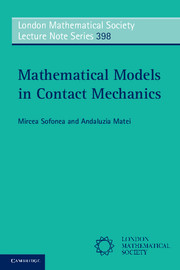Book contents
3 - History-dependent variational inequalities
from I - Introduction to variational inequalities
Published online by Cambridge University Press: 05 October 2012
Summary
In this chapter we deal with the study of variational inequalities which involve the so-called history-dependent operators. We start with some preliminary material on spaces of vector-valued functions. Then, in order to illustrate the main ideas which are developed in this chapter, we analyze two nonlinear equations which lead to history-dependent operators. We proceed by introducing the concept of the history-dependent quasivariational inequalities together with a theorem on their unique solvability. Also, we state and prove a general convergence result in the study of these inequalities. Next, we particularize our results in the study of evolutionary variational and quasivariational inequalities. Besides their own interest, the results presented in this chapter represent crucial tools in deriving the existence of a unique weak solution to frictionless and frictional contact problems with viscoelastic and viscoplastic materials. Even if most of the results we present in this chapter still remain valid for more general cases, we restrict ourselves to the framework of strongly monotone Lipschitz continuous operators in Hilbert spaces as this is sufficient for the applications we consider in Chapter 6. Everywhere in this chapter X denotes a real Hilbert space with inner product (·,·) X and norm ⊂ ·⊂X.
Nonlinear equations with history-dependent operators
In this section we consider two nonlinear equations in Hilbert spaces which lead to history-dependent operators. This will allow us to illustrate the main idea of this chapter which consists of unifying the study of various types of evolutionary equations or inequalities, by using a convenient choice of the variables and operators.
- Type
- Chapter
- Information
- Mathematical Models in Contact Mechanics , pp. 57 - 80Publisher: Cambridge University PressPrint publication year: 2012



